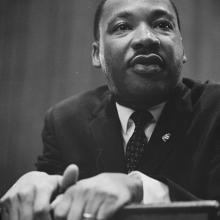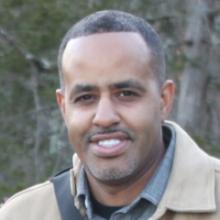Dr. Martin Luther King
If you’ve heard white evangelical pundits lately, you’ll know there’s a dangerous “new” enemy threatening U.S. Christianity. If left unchecked, they say, this enemy will wreak havoc on traditional values and transform our entire nation into atheists. What is this growing enemy of evangelicals? Democratic socialism.
The two major streams of Christian engagement on war are pacifism and just war theory, which comes out of Catholic social teaching. The pacifist response to Syria strikes is clearly opposed. As for the just war analysis, it takes a little explaining, but reaches the same conclusion.
It was a year of social service program shutdowns driven by the governor’s office in Springfield. The Rev. Dr. Martin Luther King’s description of a triplet of giant evils, each insoluble in isolation from the others, helps us identify an answer to the Tribune’s question. King spoke of the giant triplets of racism, extreme materialism, and militarism. Training for, and the diversion of money to, wars overseas was a crisis inextricable from the race crisis at home, as were policies promoting radical wealth inequality. Rep. Danny Davis of Chicago, whose grandson was killed by gun violence in 2016, insists that “poverty was fueling the city’s bloodshed, and that Chicago needed to make investments ‘to revamp whole communities.’
Rodnell Collins stood next to his uncle, Malcolm X, as the latter stared thoughtfully at Plymouth Rock during a visit to Massachusetts when Collins was a child.
It wasn’t until years later that Collins, the son of Malcolm’s sister, Ella Little Collins, would learn what his uncle was thinking: “We didn’t land on Plymouth Rock. The rock was landed on us.”
Malcolm X, the African-American nationalist leader and onetime minister of the Nation of Islam who was assassinated 50 years ago Feb. 21, inspired countless people with the frank and uncompromising way he spoke about race relations in America. And much of what he said about the experiences of black Americans remains true today, experts say.
Yet, while other civil rights leaders of the 1950s and ’60s are more broadly celebrated as American heroes, the fire with which Malcolm X spoke still overpowers the words he was saying.
(Editors Note: Faith, immigrant rights, and labor leaders launched the "Fast for Families: A Call for Immigration Reform and Citizenship," Nov. 12, taking place on the National Mall. Leaders and immigrant members of the community are fasting every day and night, abstaining from all food — except water — to move the hearts of members of Congress to pass immigration reform with a path to citizenship. This post is composed of updates from Lisa Sharon Harper, director of mobilizing for Sojourners, as she experiences the fast.)
Eleven national leaders marked this as the first day of a 30-day rolling fast for families — a call for immigration reform and a path to citizenship. The fasters and other leaders of the civil rights movement, including Julian Bond (civil rights veteran), Rev. Jim Wallis (Sojourners) and Wade Henderson (Leadership Conference on Civil Rights), walked into that tent and behind the podium.
One after another, the fasters stood before the podium — Sister Simone Campbell, Dr. Barbara Williams-Skinner, Eliseo Medina, Dae Joong Yoon—and offered testimony. This is why we are fasting. We are fasting because we cannot wait any longer. We are fasting because we stand with the 11 million people and their families who cannot wait for congress to get itself together for the pain and suffering in their families to end. We are fasting because whether we are immigrants who came here voluntarily in the last century or our ancestors were brought here in chains 200 years ago, we are fasting America a better place for all.
Blogger Hamden Rice's 2011 essay "Most of You Have No Idea What Martin Luther King Actually Did" has become an underground classic that rightly resurfaces around King Day events.
Last Thursday, Jan. 12, I was arrested in the Bronx for civil disobedience along with 43 others. It was a group that consisted mainly of clergy and church laity, a grassroots evangelical effort led by Bronx Councilmen Fernando Cabrera. Our protest was aimed at the city’s decision to prevent 160 churches from renting worship space in public schools beginning, Feb. 12.
I would like to clarify the nature of my involvement. I remain a proponent of healthy boundaries between church and state. The church I presently lead does not meet in a public school, and we’re not faced with an impending threat of relocation. My inspiration to protest began when I discovered how the city’s decision would affect churches in the Bronx — the poorest urban county in the country.
If New York City remains a trendsetter, a decision like this could lead to numerous copycat decisions in poorer districts all over the country.
Fifty years ago, not long after his graduation from Brandeis University, Rabbi Allen Secher became a Freedom Rider, joining Dr. Martin Luther King's historic fight for equality in the South. In Albany, Georgia, Secher, who served congregations in Mexico City, New York, Los Angeles and Chicago before relocating to Whitefish, Mont., several years ago (where he was, for a time, the only resident rabbi in the entire state), was jailed for a week along with a number of other Freedom Riders.
Inside, watch Secher, aka "The Naked Rabbi," tell the story of the Freedom Rides and his encounter with King.
The legacy of Martin Luther King, Jr., and the reality of climate change are both victims of western culture’s remarkable capacity to accommodate and neutralize that which is most critical of it.
Early in the civil rights movement, Bayard Rustin said to King, “I have a feeling that the Lord had laid his hand upon you. And that is a dangerous, dangerous thing.” Similarly, the FBI once described Martin King as the “most dangerous man in America” – and yet, as Martin Luther King Jr day rolls around again in the United States, we are often presented with a figure that seems more like a cheerleader for the status quo rather than a prophetic challenge to it. Somehow, it seems we have made this dangerous figure very safe.
For instance, in a speech at the Pentagon commemorating King’s legacy, the Defense Department’s general counsel Jeh C. Johnson remarked, “I believe that if Dr King were alive today, he would recognize that we live in a complicated world, and that our nation’s military should not and cannot lay down its arms and leave the American people vulnerable to terrorist attack.”
But to claim that Dr King would be pro-war today is as likely as him being pro-segregation. After all, this is the Dr King who said, “A nation that continues year after year to spend more money on military defence than on programs of social uplift is approaching spiritual death.” And this is the same Dr King who said in his speech on 4 April 1967 (a speech that turned three quarters of American public opinion against him), “To me the relationship of the ministry [of Jesus Christ] to the making of peace is so obvious that I sometimes marvel at those who ask me why I’m speaking against the war.” And this is the same Dr King who said, the night before he was murdered on 4 April 1968, “It is no longer a choice, my friends, between violence and nonviolence. It is either nonviolence or nonexistence.”

Port-au-Prince church post-earthquake. Photo by Colin Crowley via Wylio http://www.wylio.com/credits/Flickr/4293703467
How does one dig out from under such tragedy? How does one have hope for a better life, for a new Haiti?
In a meditation titled "The Gates of Hope," Minister Victoria Safford writes:
"Our mission is to plant ourselves at the gates of hope -- not the prudent gates of Optimism, which are somewhat narrower; nor the stalwart, boring gates of Common Sense; nor the strident gates of self-righteousness ... nor the cheerful, flimsy garden gate of 'Everything is gonna be all right,' but a very different, sometimes very lonely place, the place of truth-telling, about your own soul first of all and its condition, the place of resistance and defiance, the piece of ground from which you see the world both as it is and as it could be, as it might be, as it will be; the place from which you glimpse not only struggle, but joy in the struggle — and we stand there, beckoning and calling, telling people what we are seeing, asking people what they see."
Indeed, we need to plant ourselves at the gates of hope and work toward a just peace, on Earth as it is in heaven.

Dr. Martin Luther King, Jr., in 1964. Image via Wiki Commons http://bit.ly/zBt6dr
The Rev. Dr. Martin Luther King did not give his life just for Black Americans, but for all Americans. He knew America could be better. He knew the America that was birthed with the hope of “liberty for all” excluded hundreds of thousands of people.
As he said in his famous sermon that is so often referred to as the “I Have a Dream” speech,
In a sense we have come to our nation's capital to cash a check. When the architects of our republic wrote the magnificent words of the Constitution and the Declaration of Independence, they were signing a promissory note to which every American was to fall heir. This note was a promise that all men, yes, black men as well as white men, would be guaranteed the unalienable rights of life, liberty, and the pursuit of happiness....
Vincent G. Harding wrote the speech Martin Luther King Jr. delivered exactly one year before King was assassinated.








